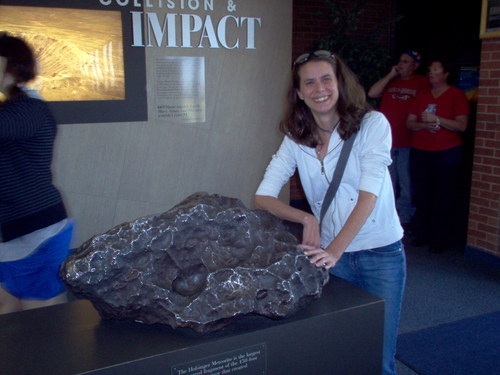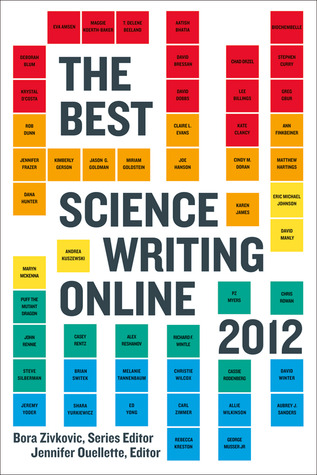![]()
![]()
Up-Goer 5
-
We found ourselves right at the centre of this week’s dominant Twitter meme, as Anne’s post on using the Up-Goer 5 text editor to break down complex scientific concepts into simple words triggered a wealth of wonderful responses in the geoblogosphere and beyond, which we are continuing to collect at Ten Hundred Words of Science. Here are a few of our favourites:
- A sublime description of Natural Selection, based on final para of Origin of Species.
http://friendsofdarwin.com/2013/01/20130119/ - Goedel’s Theroem also yields to the challenge.
http://tenhundredwordsofscience.tumblr.com/post/40957923106/not-so-long-ago-people-had-no-computers-they - This one describes telescopes as ‘far-seers’ and has a pretty good explanation of adaptive optics.
http://tenhundredwordsofscience.tumblr.com/post/40920947704/so-our-world-is-a-big-round-rock-in-space-with-a - Space boxes and ground-shakes: Tim Wright explains satellite geodesy.
http://tenhundredwordsofscience.tumblr.com/post/40809335841/my-work-tries-to-understand-why-the-ground-under
The challenge has also been spread further afield by write-ups at the Smithsonian Magazine, The Guardian, Grist, and io9.
And now, the creator of the nifty text editor that started it all, Theo Sanderson, has created Up-Goer 6, which colour-codes words according to their frequency:
http://splasho.com/upgoer6/
Volcanoes
- Kamchatka is awesome. FOUR volcanoes erupting simultaneously all within 110 miles of each other.
http://earthobservatory.nasa.gov/NaturalHazards/view.php?id=80226
(via @eruptionsblog, @rsimmon)
Earthquakes
- Very cool find by Lockwood: the surprisingly intricate pattern traced in sand by an earthquake-shaken pendulum.
http://www.earthquakerose.com/ - Three years after the earthquake in Haiti, and it’s very difficult to track where $9 billion in ‘aid’ actually went.
http://www.guardian.co.uk/global-development/poverty-matters/2013/jan/14/haiti-earthquake-where-did-money-go - Ancient accounts of tsunami recorded by Indian copper plates?
http://www.thehindu.com/arts/books/pandya-copper-plates-speak-of-tsunami/article4305083.ece - David Bressan on the 1995 Kobe EQ and early attempts at making earthquake-resilient buildings
http://blogs.scientificamerican.com/history-of-geology/2012/01/17/january-17-1995-the-kobe-earthquake-and-early-antiseismic-architecture/
(via @paleoseismicity) - Tohoku-Oki tsunami created underwater bedforms 20 m long by ~2 m high off coast of Japan.
http://www.ouramazingplanet.com/3999-japan-tsunami-left-underwater-dunes.html
(via @clasticdetritus, @NOAAOceanToday)
Planets & Astronomy
- Great write-up of latest Curiosity results by Emily Lakdawalla: Glenelg full of rocks deposited in and altered by water.
http://www.planetary.org/blogs/emily-lakdawalla/2013/01151352-curiosity-sol157-glenelg-candy-store.html - The search for astronomical evidence of the nature of dark matter is getting interesting.
http://www.bbc.co.uk/news/science-environment-21043381 - Why the Universe needs Dark Matter (and not MOND) in one graph
http://scienceblogs.com/startswithabang/2013/01/18/why-the-universe-needs-dark-matter-and-not-mond-in-one-graph/
(via @JenLucPiquant)
Fossils
- New study suggests that (vertebra?) of early tetrapods may have been reconstructed the wrong way round. Oops.
http://www.bbc.co.uk/news/science-environment-20987289
(Paleo)climate
- Draft of US National Climate Assessment starkly asserts AGW already having major impacts.
http://www.guardian.co.uk/environment/2013/jan/12/us-scientists-effects-global-warming
Water
- Looks like the Mississippi will stay open for shipping, thanks to rock blasting by Corps
http://www.nytimes.com/2013/01/18/us/mississippi-shipping-continues-despite-drought.html
(via @gravelbar) - Fascinating for anyone discussing water. MT : Army Corps’ Options Dwindle Along With Mississippi River
http://www.npr.org/2013/01/13/169243113/army-corps-options-dwindle-along-with-mississippi-river?ft=1
(via @stressrelated, @nprnews) - Green ideas for protecting New York harbor from storm surge and sea level rise. n
http://t.co/hjN8OWNWu20
(via @TNatureOfCities) - A nice clear explanation of the mechanics of center pivot irrigation
http://www.kuriositas.com/2012/06/center-pivot-irrigation-explained.html - Are you a hydroecologist or ecohydrologist?
http://snowhydro1.wordpress.com/2013/01/15/playing-with-graphs/
(via @WaterWired, @SnowHydro) - Nifty new stormwater runoff calculator developed by my grad student as an undergrad res project!
http://www.esf.edu/ere/endreny/GICalculator/index.html - Excellent post by @Geomorphology: The fluvial geomorphology of East Anglia – a brief history/introduction
http://t.co/RBr670MIu20 - I wouldn’t call the Umpqua and Eel small rivers, but I suppose to oceanographers they are. Particulate organic matter export by two contrasting small mountainous rivers from the Pacific Northwest, U.S.A.
http://onlinelibrary.wiley.com/doi/10.1002/jgrg.20024/abstract - KSU colleague Brian Lutz has a new paper out on wastewater generation from Marcellus gas development (paywall)
http://onlinelibrary.wiley.com/doi/10.1002/wrcr.20096/abstract - Video: Understanding the world’s largest rivers – @RioParana explains why they are important & different.
http://www.youtube.com/watch?v=R1f2Fv_Tjg4&feature=youtu.be
Environmental
- Flying over the Earth at night, North Dakota is lit up by fracking gas flares.
http://www.npr.org/blogs/krulwich/2013/01/16/169511949/a-mysterious-patch-of-light-shows-up-in-the-north-dakota-dark
(via @GenAnthropocene, appropriately enough) - High temperatures in Gulf of Mexico helped weather Deepwater Horizon oil.
http://environmentalresearchweb.org/cws/article/news/52060
(via @guertin, @EuroGeosciences) - New analysis estimates tidal power could provide>20% of UK’s electricity demand; maturing tech increasing potential.
http://www.bbc.co.uk/news/science-environment-20983645 - Want to know how they are extracting methane from the bottom of Lake Kivu? Here’s a great video explainer:
http://www.youtube.com/watch?v=N3PHPHyRxjE&feature=youtu.be - Photoshopping the trees out of some famous paintings: Imag(in)ing a world without trees via
http://forestplanet.wordpress.com/2013/01/08/imagining-a-world-without-trees/
(via @StatelyTrees, @fortiain)
General Geology
- ‘On the Strata of the Earth’ by early Russian scientist Mikhail Lomonosov reveals a uniformitarian who pre-dated Hutton, and I’ll think I’ll have to nick this quote: “Searching for stones without testing what you find is boring and not very productive”
http://blogs.scientificamerican.com/history-of-geology/2013/01/18/book-review-on-the-strata-of-the-earth/ - New Nature paper presents geochemical evidence from hotspot lavas for melt-rich regions at the base of the mantle.
http://www.nature.com/nature/journal/v493/n7432/full/nature11771.html?WT.ec_id=NATURE-20130117 - Nice article on the Gaia hypothesis & its fractious, yet still very real scientific impact:
http://www.aeonmagazine.com/world-views/michael-ruse-james-lovelock-gaia/
(via @aeonmag) - Interesting review paper: how complex structure of subduction zones leads to unique segmentation and seismicity patterns.
http://www.sciencedirect.com/science/article/pii/S0040195113000206 - After a year’s wait it looks like (hopefully) uncontaminated Lake Vostok water is in hand – now let’s see what’s in it.
http://blogs.scientificamerican.com/life-unbounded/2013/01/13/lake-vostok-water-ice-has-been-obtained/
(via @caleb_scharf) - @lockwooddewitt is doing a post every day for 2013 showing off Oregon geology
http://outsidetheinterzone.blogspot.com/search/label/Geo%20365
(via @clasticdetritus, )
Student Opportunities
- REU announcement: Ecosystem restoration through interdisciplinary exchange (ERIE) at U Buffalo
http://www.erie.buffalo.edu/REU.php - Fantastic undergraduate research opportunity at Hubbard Brook Experimental Forest
http://all-geo.org/jefferson/fantastic-undergraduate-research-opportunity-at-hubbard-brook-experimental-forest/ - Looking forward to the new series by @SFriedScientist: Surviving Grad School: A Practical Guide to an Impractical Lifestyle:
http://www.southernfriedscience.com/?p=14026
Interesting Miscellaney
- Excellent overview of how scientific process makes its conclusions more than ‘mere opinion’.
http://www.guardian.co.uk/science/2013/jan/13/jeff-forshaw-climate-change-science - You wouldn’t want to navigate with it, but very cool: a planisphere, or palindromic Earth map. The same both ways up!
http://bigthink.com/strange-maps/594-mind-over-map-the-world-is-what-you-make-it - Tough question: how do we move students beyond a ‘Cargo Cult’ approach to university education?
http://fractalplanet.wordpress.com/2013/01/10/cargo-cult-college-students/ - Wow: ‘The 100 richest people in the world earned enough last year to end extreme poverty four times over’
http://www.bbc.co.uk/news/uk-21094962
(via @PaulLewis, @CatrinNye) - XCKD manages to simultaneously argue for maths literacy, and warn that it is a Pandora’s box of ‘Ew’
http://xkcd.com/1161/ - Some simple plot-making using R the comment thread is rich and will definitely help me get to where I want to be
http://clasticdetritus.com/2013/01/10/creating-data-plots-with-r/
(via @clasticdetritus) - Don’t Underestimate NSF’s New Grant-Submission Rules
http://chronicle.com/article/Dont-Underestimate-NSFs-New/136521/





Nice plan for content warnings on Mastodon and the Fediverse. Now you need a Mastodon/Fediverse button on this blog.